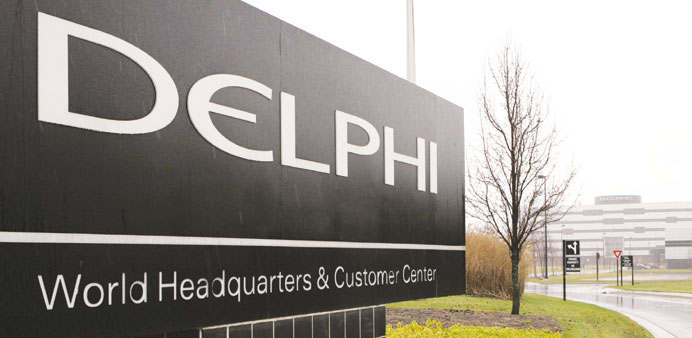Delphi Corp headquarters are pictured in Troy, Michigan. Delphi says it expects HellermannTyton to help it take advantage of increasing demand for vehicles that connect to the web and smart devices such as phones and tablets.
Reuters/Troy, Michigan
US-listed auto parts supplier Delphi Automotive is buying British cable equipment maker HellermannTyton Group for about £1.1bn ($1.7bn) as it seeks to capitalise on the growing connected-car market.
Delphi said it expects HellermannTyton, which makes products for fastening, fixing, and protecting cables, to help it take advantage of increasing demand for vehicles that connect to the web and smart devices such as phones and tablets.
“With consumers now demanding more connectivity in their vehicles, electrical architecture is the enabler to that added vehicle content,” said Delphi chief executive Kevin Clark.
The acquisition is the latest example of automotive suppliers moving beyond nuts and bolts into higher-value components such as electronics and software.
In May, rival auto supplier Continental AG bought software company Elektrobit Automotive and last September, Germany’s ZF Friedrichshafen pounced on US-based TRW Automotive Holdings Corp, combining one of the largest makers of automatic gearboxes with a maker of automatic safety products.
Vehicle connectivity and methods to increase fuel efficiency are high-margin and high-growth areas in the industry. New safety and anti-pollution rules are forcing cars to become more intelligent so engine management and gear shifting systems are fuel efficient, and so vehicles can better perform semi-automated functions like accident avoidance and cruise control.
Delphi will pay 480 pence in cash for each HellermannTyton share, a 44% premium to its closing price on the London Stock Exchange on Wednesday.
The company was the top FTSE 250 gainer and the most actively traded stock on the index.
Delphi also announced some other, smaller, investments yesterday. It said it had bought software company Ottomatika and made a strategic investment in 3D LiDAR sensing company, Quanergy. It has also made a minority investment in Tula Technology, which develops software that provides cost-efficient, fuel economy gains in cylinder deactivation technology.
Clark said in April that Delphi could spend $1bn to $3bn in 2015 on a large acquisition related to its traditional “hardware” business, and would make smaller investments in software.

